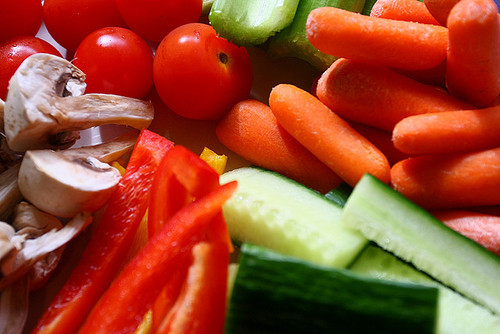There are several reasons why people decide to adopt a vegetarian diet; some do so for health reasons (vegetarian diets have been shown to lower cholesterol over time), some for environmental reasons (animal production is far more resource-intensive than plant food production), and some for ethical reasons (relating to the treatment of animals in concentrated feeding operations).

Whatever the reason for “going veg,” many athletes are concerned about the essential nutrients that might be missing from their diets that could affect their performance, namely the micronutrients vitamin B12, iron, and zinc; and the macronutrient protein.
Vitamin B12
Vitamin B12 plays an important role red blood cell formation, helping to deliver oxygen to the body’s tissues. It’s important for athletes to know their B12 status; some research suggests that athletes with poor or marginal nutritional status for the vitamin may have decreased ability to perform high intensity exercise. B12 is commonly found in meats, poultry, seafood and cheese, making it a challenge for strict vegetarians to get enough from diet alone. InsideTracker measures the level of B12 in your blood, and your Food Menu can recommend foods to boost your status if it’s suboptimal.
Fortified breakfast cereals are a good plant-based source of B12 to stock up on, and dairy products can provide adequate amounts of the nutrient or lacto-vegetarians. (Be careful not to over-do it with fortified cereals and nutrition bars if you’re stocking up to avoid deficiency. Keep in mind that for men and women over the age of 14, the recommended intake is only 2.4mcg per day.)
Iron
Perhaps the greatest risk to athletes when giving up meat is the risk of developing iron deficiency anemia, the world’s most common nutrient deficiency. Athletes, especially female athletes, tend to deplete iron stores more quickly, meaning they need to consume often two to three times more than the average person. Iron functions primarily as a carrier of oxygen in the body, both as a part of hemoglobin in the blood and of myoglobin in the muscles, making it essential for athletes to maintain adequate stores.
Unfortunately for vegetarians, the form of iron found in meat (called heme iron) is more readily absorbed by the body than non-heme iron found in plants. Many vegetarians turn to supplements to ensure healthy iron levels for optimal performance. InsideTracker can you help you determine if your ferritin level (a blood marker for iron) is where it needs to be, and can recommend dietary strategies (such as consuming non-heme iron-rich foods with vitamin C to boost absorption) to improve your level if necessary.
Zinc
Zinc is commonly found in animal products such as beef, pork, seafood and poultry; but it’s also prevalent in several plant-based sources. It’s important for athletes to check their zinc levels because of the mineral’s role in immunity, protein synthesis and proper cell function. Anyone following a meat-free diet can get still enough zinc if they eat plenty of fortified breakfast cereals, oatmeal, nuts and beans. Eat up: vegetarians need to consume 50% more of the Recommended Daily Allowance of zinc than meat eaters!
Certain food preparation techniques make the zinc in food easier for your body to process. Soak beans, grains, and seeds in water for several hours before cooking them to boost absorption. Aim to eat more leavened grain products (such as bread) than unleavened products (such as crackers) because the body is better able to absorb zinc from leavened grains. Remember that InsideTracker can help you find foods that meet your dietary preferences and that are rich in the nutrients you need.
Protein
Lastly, some athletes worry that they can’t meet their protein needs on a plant-based diet. Protein is necessary for rebuilding and repairing muscle tissue after a tough workout. The American College of Sports Medicine (ACSM) recommends endurance athletes consume about 1.2 to 1.4 grams of protein per kilogram of body weight per day, whereas resistance and strength-trained athletes should aim for 1.6 to 1.7 grams per kilogram of body weight per day.
Experts agree that vegetarians need not worry, as long as they pay attention to their diets and are careful to consume complementary proteins in the same day. A complete protein source is one that provides all of the essential amino acids that the body needs. Vegetarians can combine plant sources to create complete proteins by eating complementary sources – such as rice and beans - within the same 24-hour period. Tofu, legumes, many whole grain products, and soy-based yogurts and milks are excellent sources of plant-based proteins for meat-free athletes.
The bottom line
Sports nutritionist, Nancy Clark, noted that a recent session at the American College of Sports Medicine annual meeting concluded that there’s not enough research to know how vegetarian — let alone vegan — diets truly affect athletes. There is no evidence to suggest that with careful attention to the nutrients noted in this article, vegetarian athletes perform differently from meat-eating athletes.
The decision to eat meat is a personal one. Be informed about what you put into your body and be sure to let InsideTracker help you guide your food choices, whichever diet you choose to follow. Remember that you only truly know what’s going on inside your body by taking a look at what keeps it running - your blood!
